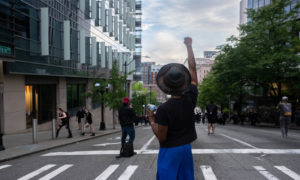The coronavirus outbreak is everywhere. It’s the drunken party guest on the global stage nobody wanted; vomiting on the furniture, smashing the glass coffee table of the global economy, ruining our personal lives, and smearing its grubby little hands on everything from local mom-and-pop businesses like barber shops and bakeries to larger businesses like air travel and the film industry.
Some companies are benefiting from the outbreak. Coronavirus-spurred products are a reminder that some companies will always profit during a global crisis – but, that’s not always a bad thing.
Familiar businesses like Netflix, Hulu, and Amazon continued right on entertaining people who are stuck at home, unsurprisingly, while newer video platforms like Zoom are enabling remote work to continue, in addition to giving us a way to stay in touch with family and friends or play games. The rest of the success stories are busy selling us the things we need right now. Purell (the hand sanitizer we were slowly learning to ignore when we thought it was doing us more harm than good) is this year’s gold — and it’s in high demand. That demand gave rise to a wave of do-it-yourself recipes for sanitizer meant to be mixed in the common household kitchen. Small craft distillers took up the challenge early on in the outbreak, doing what they could to protect us from COVID-19 even as they, too, were in danger of going out of business. With the raw materials already on hand, they’ve pivoted to making alcohol-based sanitizers for first responders and their local communities.
So, what does a successful post-coronavirus business model look like? That’s a question on the minds of most anyone financially impacted by the virus. In light of Gov. Jay Inslee’s extension of his “Stay Home, Stay Healthy” emergency order, which bans all gatherings and temporarily shutters non-essential businesses through May 4, it would appear that, for the immediate future, a successful business is one that will support our new indoor lives.
Restaurants across the country have had to pause their dine-in options as a result of local and state-wide efforts to prevent the spread of the coronavirus. As a result, some restaurants have pivoted to the role of corner stores, offering amenities like pet food, toilet paper and masks just to stay afloat.
Pink Dot is a quick delivery, prepared-to-order grocery store based on the Sunset Strip in West Hollywood, California. Founded by Bill Toro in 1987 with the purchase of a single liquor store, his idea came about as a necessary response to Los Angeles’ legendary bad traffic. Pink Dot sells slightly upscale corner market comfort items like food, alcohol, cigarettes, and essentials for women and men, but also COVID-19 supplies: masks, toilet paper, Lysol, and detergent. A business model like Pink Dot’s could succeed in any sufficiently sized town impacted by the virus.
As an added bonus, individual delivery drivers bringing products to customers reduces the number of cars on the road, thereby reducing (or eliminating) their commute, and enabling them to be more productive. They could then fill that gap in their schedule as they saw fit: exercise, family time, self-care, or getting more sleep.
TaskRabbit is an online mobile marketplace that matches freelance labor with local demand, providing customers with immediate help with everyday tasks like house cleaning, furniture moving, delivery requests or handyman work. Founded in 2008 by Leah Busque, TaskRabbit retains tens of thousands of vetted, background-checked “Taskers” who provide services across a wide array of categories. Busque founded TaskRabbit when she had no time to buy dog food.
I’m definitely not a business major, and I’m certainly not going to speculate as to how long this quarantine will last. But the key to successful business has always been figuring out what people want or need, and filling that niche where, when, and how they need it. And right now, as the anti-quarantine protestors will gladly tell you, people want haircuts, among other things. As this unusual time progresses, we will see firsthand what the post-quarantine business evolves to look like.






Comments are closed.